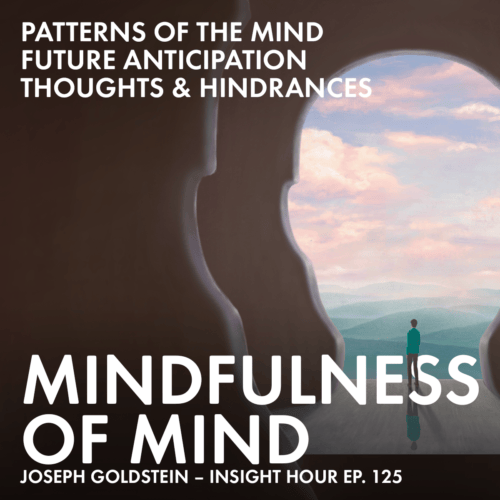
In this recording from the Insight Meditation Society, Joseph Goldstein focuses on the third foundation of mindfulness: the mindfulness of mind.
How to Practice Mindfulness of Mind
Mindfulness of mind essentially means being aware of whatever is going on within you. For example, when the mind is lustful, know that it is lustful. We should not only pay attention to what state we are in, we should also be aware of what state we are not in. Recognizing that the mind is free from lust is just as important as recognizing being lustful. It is a very simple practice in being aware. In this foundation of mindfulness, you do not need to do anything more. Just like checking the weather every morning, we can check in with our minds.
“Mindfulness means being aware of all of these different weather patterns of the mind without greed, without hatred, without delusion, without identification, even when those are the states we are being mindful of.” – Joseph Goldstein
Tune into this micro-episode of David’s View to learn more about mindfulness: What the Heck is Mindfulness? Pt. 3 – Post-Meditation
Future Anticipation (12:12)
An audience member asks Joseph how to mindfully navigate anticipation for the future. He wonders how he can manifest the life he wants without clinging to things that do not yet exist. Joseph says there are a couple of things we can do in order to release the mind from preoccupation with the fascination of the future. We can label the anticipatory thoughts that arise as Māna (a Buddhist term that means conceit). It is seen as somewhat conceited to preoccupy oneself with the “I am” and “I will be”. The second thing we can do is just witness the thoughts/desires about the future without overanalyzing ourselves. We can let them be.
Tune into Desire On the Spiritual Path for Krishna Das’ perspectives on navigating desire.

Thoughts and Hindrances (23:32)
Is it possible to actually be free from all the defilements of the mind? An audience member posits that if we have a thought, it is likely fueled by one of the five Buddhist hindrances (attachment, aversion, ignorance, pride, and jealousy). However, it seems impossible to be totally absent of thought. Joseph tells us:
“There can be thoughts that are not fueled by defilement. When you are doing metta there are thoughts in the mind and they’re wholesome thoughts of compassion. So thought in itself does not imply an unwholesome mindstate.” – Joseph Goldstein
Joseph suggests a practice we can all try to develop our knowingness without judgment. Rather than thinking about all of our thoughts or sensations as arising from a hindrance, just notice the thought. Knowing in itself can not inherently be bad. He suggests stepping outside in the dead of winter and feeling the painfully cool breeze. Notice what it feels like, notice the unpleasantness. Then, step inside to feel the warmth and notice the pleasantness. The nature of knowing is the same in both circumstances, despite the level of perceived positivity.
